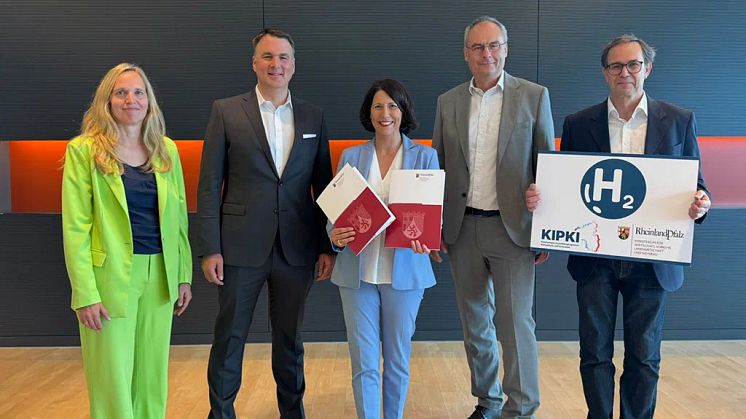
News -
H2 Initial Grid Mainz: Building Blocks for a Hydrogen Ecosystem
As part of the new “H2 Initial Grid Mainz” project, Mainzer Netze GmbH – a subsidiary of the municipal utility Stadtwerke Mainz – is planning to establish an initial hydrogen grid in the industrial areas of Mainz-Neustadt and Mombach, in collaboration with its partner Hy2gen Deutschland GmbH from Wiesbaden. The project also includes the construction of an electrolyzer to supply a hydrogen refueling station and local industrial companies with green hydrogen. The Ministry of Economic Affairs of Rhineland-Palatinate is supporting the pipeline project, which is expected to cost over ten million euros, with approximately 7.2 million euros in funding. Minister Daniela Schmitt today handed over the funding decision to Stadtwerke board member Kerstin Stumpf and Mainzer Netze Managing Director Michael Worch, as well as a second notice to Bernd Hübner, CFO of Hy2gen.
What will the new Mainz hydrogen grid look like?
The plan includes a new, approximately 2.6-kilometer-long underground pipeline, which will transport hydrogen once operational. The pipeline will start at the premises of Wirtschaftsbetrieb Mainz near the Mombacher traffic circle and run from the wastewater treatment plant along Rheinallee to the headquarters of Schott AG.
"Together with our companies, municipalities, and research institutions, we as the state government are driving forward the hydrogen economy in Rhineland-Palatinate. I am pleased that we can support the Mainz project with a total of around nine million euros through our KIPKI hydrogen funding competition,” said Minister for Economic Affairs Daniela Schmitt. “In our technology-neutral approach to the transformation of industry and mobility, hydrogen plays a crucial role.”
“With the pipeline and electrolyzer, which will also supply a hydrogen refueling station, Stadtwerke Mainz and Hy2gen are creating further essential building blocks for a comprehensive hydrogen ecosystem – from production and distribution to application in industry and transportation. In particular, industrial and commercial companies near the industrial port area as well as heavy-duty vehicles such as buses or waste collection trucks will be able to benefit from this new hydrogen infrastructure,” the minister added.
Connection with minimal effort
The H2 Initial grid has been deliberately designed to enable major industrial consumers – such as Schott, Mainzer Mobilität, and various industrial and logistics companies – to connect to the pipeline with minimal effort, especially once they convert their production processes or fleets to hydrogen. The catchment area of the new pipeline includes a large portion of Mainz’s potential future hydrogen consumers.
The hydrogen refueling station, previously located at ESWE Verkehr’s site in Wiesbaden, will also be connected to the new grid. In the coming months, the station will be relocated to the Mombach wastewater treatment plant site. Once operational, it will be used to refuel the six fuel cell buses of the Mainz public transport company and will also be open to the general public.
Michael Worch, Managing Director of Mainzer Netze GmbH, expressed his gratitude for the state’s financial support, without which the project would not be feasible. “As a regional electricity and gas grid operator, we are at the center of the energy, transport, and heating transition. If we are serious about achieving our climate goals, we need lighthouse projects like this to drive the shift toward a climate-friendly hydrogen economy.”
Electrolyzer planned on Rheinallee
Where will the hydrogen come from to supply the new pipeline and refueling station? The plan is to build an electrolyzer on an existing Mainzer Netze property on Rheinallee. Partner company Hy2gen will be responsible for constructing the electrolyzer and operating the hydrogen refueling station, while Mainzer Netze will plan and build the high-pressure hydrogen pipeline.
“As a ‘Meenzer Bub’ (Mainz native), it gives me great pleasure to help realize this forward-looking project alongside Stadtwerke Mainz. Schoolchildren – including my own – will soon be riding buses powered by renewable hydrogen from Mainz and experiencing the future of mobility in their daily lives. For the industry along Rheinallee, we are also offering a sustainable yet low-threshold opportunity to switch to hydrogen,” said Matthias Lisson, Managing Director at Hy2gen and future operator of the production facility.
Mainzer Netze estimates the total cost of the pipeline project to be just over ten million euros. A final investment decision is expected by the end of 2025 following preliminary planning and detailed economic analysis.
Background on Mainz’s hydrogen projects
Since 2015, Stadtwerke Mainz AG and Linde have operated the Energiepark Mainz, where green hydrogen is produced from renewable electricity. Up to ten percent green hydrogen, produced at the Energiepark, has been blended into the natural gas grid to supply households in the Ebersheim district. The Energiepark is currently being modernized, as key components such as electrolyzers need to be replaced due to aging.
In 2022 and 2023, in collaboration with companies Schott and Essity, the utility successfully tested hydrogen use in industrial processes in the glass and paper sectors. In addition, Mainzer Verkehrsgesellschaft (MVG) uses hydrogen to operate six fuel cell buses. In 2025, the hydrogen refueling station operated jointly with ESWE Verkehr GmbH in Wiesbaden is set to be relocated to the Wirtschaftsbetrieb Mainz (WBM) in Mombach.
